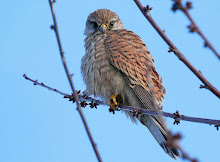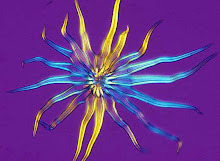Low Burnhall is a Woodland Trust reserve just south of Durham city, with new tree planting to link up fragments of ancient woodland. It will take a while to produce a continuous woodland canopy but in the meantime the existing woodland and large areas of open grassland are home to a wide range of interesting insects species.
Our best find on this visit was this handsome wasp beetle, Clytus arietis, an amazing example of mimicry. It not only looks like a wasp, it moves like a wasp too, with the same jerky walk. No sting, perfectly harmless. Breeds in decaying wood - we found it close to the rotting fallen branches of an old willow.
Our visit coincided with the hatching of scores of five-spot burnet moths.
Unhatched .....
..... and hatched five-spot burnet cocoons
Newly emerged five-spot burnets mating
Possibly the shortest courtship ever - these two five-spot burnets emerged simultaneously from the upper and lower cocoon and mated immediately
There were plenty of newly-emerged ringlet butterflies around. They even fly in light rain.
A very unlucky large skipper, caught by a spider. Maybe the two froghoppers will be luckier when they emerge from their cuckoo spit.
The caterpillar of the Timothy tortrix moth Aphelia paleana, which feeds on a wide range of plants including docks and plantains, as well as Timothy grass. Thanks to Colin Duke for identifying this for me, via the excellent iSpot web site
A capsid bug - I think this is the cock'sfoot bug Leptopterna dolobrata
A sawfly, which I think is a Tenthredo species , feeding on buttercup nectar
Forest shieldbug, Pentatoma rufipes, on an oak leaf.
Kentish snail Monacha cantiana, found inside a curled-up hogweed leaf. Thanks to Martyn John Bishop and Steve Gregory for identifying this for me, also via the excellent iSpot web site
Subscribe to:
Post Comments (Atom)





































Great set of insects, the wasp beetle is stunning and love the colour of the Sawfly.
ReplyDeleteAnd iSpot is so good, have started using it a lot .
Amanda xx
iSpot is a wonderful resource isn't it. Interesting to see all the stuff that people are finding.
DeleteThis is a great selection. I bet you were thrilled with this outing.
ReplyDeleteIt was drizzling when we arrived so it was a pleasant surprise to find anything!
DeleteSuperb pictures as always and what an interesting range of insects- very apt for national insect week :-)
ReplyDeleteI use ispot too- such a great resource. Are the 5 spots the narrow version? I know regular 5 spots are uncommon here in Hants so would be interested to know.
ps- cuckoo flower is doing really well and has thrown up several babies from the basal leaf, which are thriving- thank you for the tip and your help with growing them on.
Yes, it's the narrow version we have up here. Delighted to hear that cuckoo flower has done its stuff for you.
DeleteWhat a varied selection of species you found. I particularly like the sequence of the Burnet moths.
ReplyDeleteThey're lovely aren't they? the are weak fliers, so easy to approach for a photo.
DeleteA good selection there Phil. Enjoyed listening to you on 4extra a few days ago.
ReplyDeleteI didn't know there was a programme on 4extra John, thanks for the tip-off; the beeb doesn't flag up repeats.
DeletePhil: I can't remember which day it was on but it was in the 4p.m. slot - The Four O'Clock Show Could have been Monday as tomorrow has the last in the series of A Guide to Garden Wildlife. Wish it was on TV so we could see what is going on.
DeleteThanks John! Will check it out.
DeleteGreat photos as always. The five spot Burnett moths seem to be in a hurry!
ReplyDeletethey are weak fliers lotusleaf, so don't often stray far from the place where they hatched
Delete